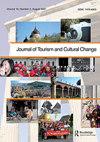生态旅游在撒哈拉以南非洲的转型和青年发展:企业社会责任在尼日利亚石油东道国社区的作用
IF 2.5
4区 管理学
Q2 HOSPITALITY, LEISURE, SPORT & TOURISM
引用次数: 1
摘要
我们研究了跨国石油公司(moc)的企业社会责任(CSR)倡议对尼日利亚尼日尔三角洲地区青年参与生态旅游发展的影响。综合倾向得分匹配和logit模型的平均处理检验结果表明,moc的企业社会责任全球谅解备忘录(GMoU)家庭和非GMoU家庭的青年在四个参数测量方面存在显著差异:资金可用性(3.76),获得适当培训(5.91),直接赞助(18.97)和青年的经济能力(8.2)。报告显示,向旅游部门提供产品和服务的机会有助于确保市场的可持续发展,并通过生态旅游相关活动增加当地社区的收入和其他收入,同时最大限度地减少经济损失。这表明,moc的亲青年GMoU生态旅游项目具有形成联系的潜力,通过创造就业机会和商业机会来帮助促进当地经济发展。这意味着年轻一代可以帮助促进经济多样化,促进创造就业和企业发展,同时帮助解决偏远地区的不发达问题和撒哈拉以南非洲棘手的环境挑战。本文章由计算机程序翻译,如有差异,请以英文原文为准。
Ecotourism for transformative and youth development in sub-Saharan Africa: the role of corporate social responsibility in Nigeria’s oil host communities
ABSTRACT We examine the impact of multinational oil companies’ (MOCs) corporate social responsibility (CSR) initiatives on enabling youth participation in ecotourism development in the Niger Delta region of Nigeria. Results from the use of average treatment test of a combined propensity score matching and logit model indicate a significant difference between youths in MOCs’ CSR global memorandum of understanding (GMoU) households and non-GMoU households in the four parameters measured: availability of finance (3.76), access to adequate training (5.91), direct patronage (18.97), and economic capability of the youths (8.2). It shows that opportunities to supply products and services to the tourism sector can help ensure a sustainable market and increase incomes and other revenues in local communities driven from ecotourism-related activities, while minimizing economic leakages. This suggests that pro-youth GMoU ecotourism projects of MOCs have the potential to play in the formation of linkages to help promote local economic development through job creation and business opportunities. It implies that a younger generation can help to promote economic diversification and contribute to job creation and enterprise development, while helping to address underdevelopment in remoe areas and intractable environmental challenges of sub-Saharan Africa.
求助全文
通过发布文献求助,成功后即可免费获取论文全文。
去求助
来源期刊

Journal of Tourism and Cultural Change
HOSPITALITY, LEISURE, SPORT & TOURISM-
CiteScore
5.10
自引率
9.10%
发文量
31
期刊介绍:
Journal of Tourism and Cultural Change ( JTCC ) is a peer-reviewed, transdisciplinary and transnational journal. It focuses on critically examining the relationships, tensions, representations, conflicts and possibilities that exist between tourism/travel and culture/cultures in an increasingly complex global context. JTCC provides a forum for debate against the backdrop of local, regional, national and transnational understandings of identity and difference. Economic restructuring, recognitions of the cultural dimension of biodiversity and sustainable development, contests regarding the positive and negative impact of patterns of tourist behaviour on cultural diversity, and transcultural strivings - all provide an important focus for JTCC . Global capitalism, in its myriad forms engages with multiple ''ways of being'', generating new relationships, re-evaluating existing, and challenging ways of knowing and being. Tourists and the tourism industry continue to find inventive ways to commodify, transform, present/re-present and consume material culture. JTCC seeks to widen and deepen understandings of such changing relationships and stimulate critical debate by: -Adopting a multidisciplinary approach -Encouraging deep and critical approaches to policy and practice -Embracing an inclusive definition of culture -Focusing on the concept, processes and meanings of change -Encouraging trans-national/transcultural perspectives
 求助内容:
求助内容: 应助结果提醒方式:
应助结果提醒方式:


